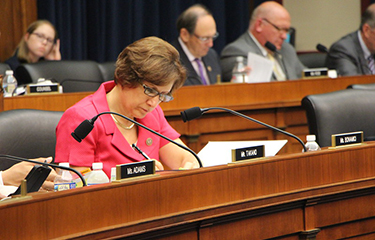US lawmakers want to establish USDA Office of Aquaculture

U.S. representatives in Congress have introduced legislation to create an office of aquaculture within the U.S. Department of Agriculture.
“Shellfish harvesters and seaweed farmers play an essential role in our food supply, but historically they haven’t received the support they need to reach their full potential,” U.S.Rep. Suzanne Bonamici (D-Oregon) said, adding that a USDA aquaculture program office “will help shellfish harvesters and seaweed farmers grow their small businesses while expanding blue carbon ecosystems that help address the climate crisis.”
The office created by the bipartisan Sustaining Healthy Ecosystems, Livelihoods, and Local Seafood (SHELLS) Act would be in charge of promoting shellfish, seaweed, and land-based aquaculture operations “that provide environmental, economic, and social benefits.” The office also would provide technical assistance and best practices for farmers while ensuring aquaculture is included in USDA programs. A representative from the office would sit on the National Institute of Standards and Technology’s Subcommittee on Aquaculture.
The new office would receive USD 25 million (EUR 23 million) in annual funding through 2028.
“The SHELLS Act creates an Office of Aquaculture within USDA to ensure the department has the vital resources it needs to strengthen our food system, promote sustainable seafood, and support American aquaculture,” U.S. Rep. Frank Pallone (D-New Jersey) said.
The Shells Act would also create an aquaculture advisory committee made up of producers, tribal representatives, state officials, scientists, and others to advise the new office.
In addition to Bonamici and Pallone, the bipartisan legislation is cosponsored by U.S. Rep. Rob Wittman (R-Virginia) and U.S. Rep. Chellie Pingree (D-Maine).
NOAA Fisheries already has an office of aquaculture which helps implement federal aquaculture policies, promotes aquaculture adoption across the U.S., and issues permits for aquaculture operations in federal waters. The office has been leading federal efforts to establish aquaculture opportunity areas – sites that have been preassessed as suitable sites for aquaculture development.
The SHELLS Act is one of a handful of bills introduced this year to streamline and support domestic aquaculture development.
In March, U.S. Rep. Jared Huffman (D-California) and U.S. Rep. Mary Peltola (D-Alaska) introduced the Coastal Seaweed Farm Act, which requires NOAA and USDA to conduct a joint study evaluating the impacts of coastal seaweed farming and develop regulations for the burgeoning sector.
“Coastal seaweed farming has tremendous potential to serve as a sustainable replacement in food products, fertilizer, and animal feed; and it comes with a myriad of benefits for coastal communities – supporting local economies, providing food security, and regenerating marine ecosystems,” Huffman said at the time.
The legislation would also create a grant program to reduce barriers to indigenous groups trying to enter the aquaculture sector.
Lawmakers in both houses of Congress reintroduced the Advancing the Quality and Understanding of American Aquaculture (AQUAA) Act – legislation that will establish national standards for offshore aquaculture and streamline development – this month.
“The aquaculture industry is growing rapidly, but the lack of a national permitting system for federal waters has held back development and prevented American producers from growing more seafood at home,” U.S. Senator Roger Wicker (R-Mississippi) said upon reintroducing the bill. “This legislation would establish comprehensive standards for offshore aquaculture, helping U.S. producers meet the growing demand for fresh, locally-sourced seafood.”
U.S. Rep. Jill Tokunda (D-Hawaii) introduced separate legislation in May that would continue and increase funding for federal aquaculture assistance, which primarily involves researching and developing new technologies. The 2018 Agriculture Improvement Act prevented the funding from expiring, but only extended it through 2023. Tokunda’s bill would further extend appropriations through 2028, increase funding from USD 7.5 million (EUR 6.9 million) to USD 15 million (EUR 13.7 million) and would amend the law to allow money to go toward indirect costs.
Photo courtesy of the Office of U.S. Representative Suzanne Bonamici






Share